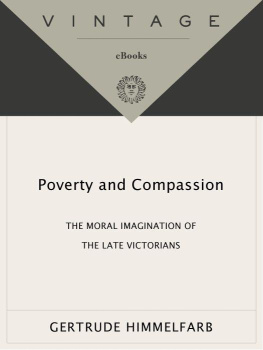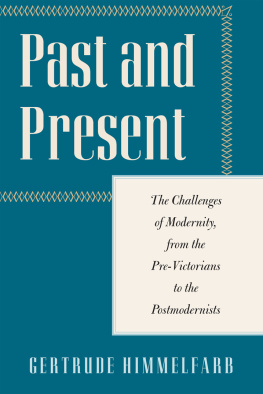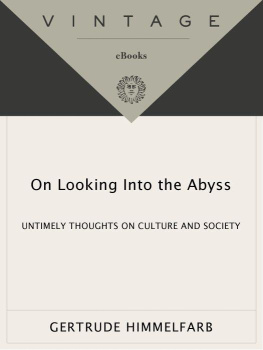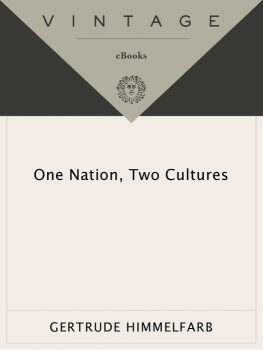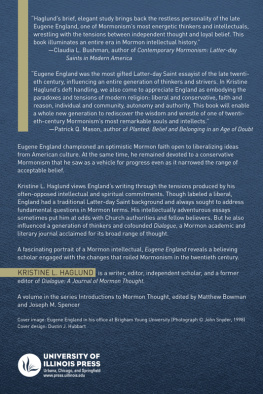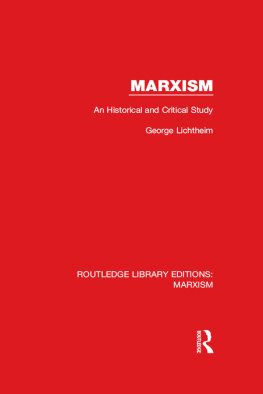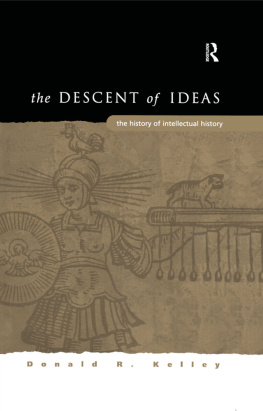VICTORIAN
MINDS
by Gertrude Himmelfarb

VICTORIAN MINDS. Copyright 1952, 1962, 1964, 1965, 1966, 1968 by Gertrude Himmelfarb. This edition was first published in 1968 and is here reprinted by arrangement with the author.
First ELEPHANT PAPERBACK edition published 1995 by Ivan R. Dee, Inc., 1332 North Halsted Street, Chicago 60622. Manufactured in the United States of America and printed on acid-free paper.
Library of Congress Cataloging-in-Publication Data:
Himmelfarb, Gertrude.
Victorian minds / by Gertrude Himmelfarb.
p. cm.
Originally published : New York : A. A. Knopf, 1968
Elephant paperbacks.
ISBN 1-56663-077-0 (alk. paper)
1. Great BritainIntellectual life19th century. 2. Great BritainHistoryVictoria, 18371901. I. Title.
DA533.H55 1995
941.081dc20
94-43053
FOR
William and Elizabeth

CONTENTS

INTRODUCTION
FROM EDMUND BURKE (172997) to John Buchan (18751940): the compass of this volume is evidently broader than a literal reading of the title would suggest. One might like to make capital of this, to take credit for flouting the conventional periodization of history and categorization of ideas. Unfortunately nothing is more conventional today than to flout the conventions. Historians feel no more bound by the old fixities of historydates, periods, political or geographical entities, distinctions of politics, economics, culture, etc.than the new nations who change at will their names, identities, constitutions, and whatever else may be alterable. The present sense of history, for good and bad, is of history created de novo. And this is true of history in both its meanings: as the past and as the record of that past. Historians assert themselves over the latter with the same zeal that politicians do over the former. If the new fashions in historical writingcontemporary history, comparative history, universal history, psychological history, interdisciplinary historydo not always seem as novel or revealing as the claims made for them, it may be because the past itself is more recalcitrant than either politicians or historians like to think. In any event, this volume makes no such claims to novelty. Such few liberties as it takes, with the word Victorian for example, have ample precedents in the literature of the subject. G. M. Trevelyans British History in the Nineteenth Century opens in 1782 (although it more austerely closes in 1901); the heart of Elie Halvys England in 1815 is the discussion of John Wesley (170391); the periodical Victorian Studies makes regular incursions into the eighteenth and twentieth centuries; and the currently published Wellesley Index to Victorian Periodicals has wisely chosen to antedate by many years Victorias accession. To extend the courtesy of Victorian Minds to the proto-Victorian and neo-Victorian takes no great imagination or daring.
Nor does the designation proto-Victorian require much justification. The intellectual and social history of the Victorians is inexplicable without reference to their predecessors. How can one understand Acton without Burke, Mill without Bentham, Darwin without Malthus? And it was not only individual thinkers who lived under and wrestled with the shadows of these giants. The major movements of the timeconservatism, liberalism, and radicalismalso bore the impress of their prototypes, and even in their present form still bear that stamp.
The rubric High Victorians may take more explaining. There are so many other persons one would have liked to include. Some of these (Newman, Disraeli, Gladstone) figure prominently in the general essays that make up the concluding section of this volume. Others (Eliot, Carlyle, Macaulay, Matthew Arnold) make more fleeting appearances; and each of these is surely deserving of very much more attention. I hope to repair some of these omissions on future occasions (with the exception, however, of Arnold, of whom I would despair saying anything that Lionel Trilling has not already said so brilliantly).
If some of these worthies have received less than their due, others may seem to have received more. In part this is because of the ambiguous nature of intellectual history. The philosopher need address himself only to the best minds of an ageperhaps only to the best minds of all time. The historian of ideas must also consider the representative minds of an age, which may well be the second-best minds. For Victorian England, fortunately, this is no great affliction, the second-best then being better than the best of many other times and places.
But whether the intention is to scale the highest reaches of the age with the best minds or to take the measure of its general contours with the second-best, one must be impressed by the variety of the terrain. The plurality of the title is deliberate. The Victorian Mind would have been more euphonious but less accurate. There is, I believe, and as I have argued in the essay of that title, something identifiable as the Victorian ethosif one sees it in contrast to preceding and following ages, if one appreciates its constantly evolving character, and if one makes allowance for the fact that it managed, at different times and in different degrees, to absorb quite distinct and even contrary ideas, ideologies, sentiments, and policies. Perhaps other ages were more single-minded; certainly some historians have suggested so. But the Victorian age exhibited, and not at its periphery but at its very center, all the diversity, and much of the perversity, of which the human mind is capable. If it was an age of unbelief, it was as much an age of belief, and not only because there were believers as well as unbelievers but also because belief and unbelief were so intimately and ingeniously related. It was an age of severe manners and morals, and of considerable latitude in behavior. It has been described by one historian as an age of equipoise, by another as an age of reform, and by still another as an age of revolution; my own sense of it is best expressed in the phrase conservative revolution. The title of one of these essays is Varieties of Social Darwinism. The title of the whole might well have been Varieties of Victorianism.
The essays also testify to the variety of style and method available to the historian of ideas. Had the essays been intended from the start as chapters in a book, they would have been more uniform in structure and tone, comprehensive in scope, and judiciously balanced. Biography, exposition, and analysis would have been meted out in proper proportion and sequence. Much would have been gained; but also (and I hope I am not making a virtue out of necessity), much would have been lost. For the fact is that different subjects are not necessarily best served by similar treatment. Occasional essays may not consort so well together, but they are likely to be better suited to their individual subjects (unless the occasion itself is constricting, which was not the case here). Thus the Mill essay is largely biographical, because it is my contention that Mill cannot be understood except in terms of his intellectual and personal history; I would go so far as to say that a purely textual analysis of any one of his works, without reference to the circumstances of its composition or its relation to his other works, is necessarily faulty. The second of the two Burke essays, on the other hand, is textual and analytical, because it is only thus that the generalities of the first Burke essay could be tested. And the discussion of Bentham is of still another order, a detailed and precise case study of a single reform proposal, because without such detail and precision it might be difficult to credit a reality that accords so little with the conventional view. The other essays are equally varied in approach and style. The long-standing quarrel among historians of ideas between the textual critics and the intellectual biographers seems to me to be as futile as the similar quarrel between narrative and analytical historians. No one method, surely, has an exclusive claim to propriety or superiority, but neither is the choice of method in any particular case a matter of indifference.


